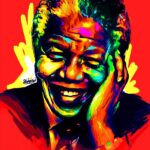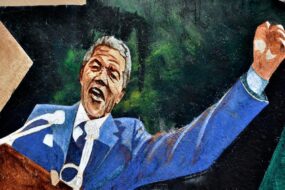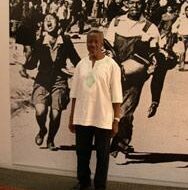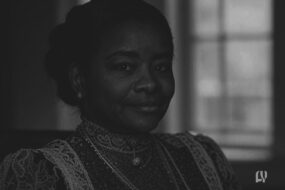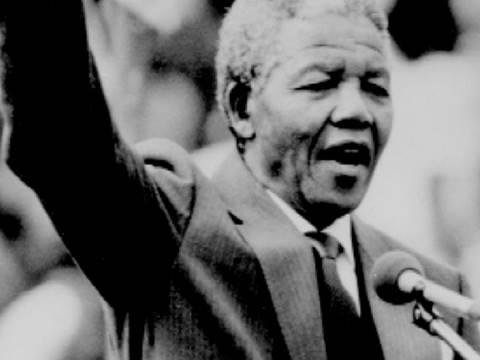
#TheDarkSideOfTheRainbowNation: Unveiling South Africa’s Secret Military Experiments
What if you discovered a secret so risky, even speaking about it could land you in prison? In the tumultuous years of apartheid, South Africa was a nation shrouded in mystery and deception. Behind the façade of a beautiful rainbow-colored landscape, the government was hiding some of its darkest secrets. From secret military experiments to classified police operations, the truth about what really happened in this enigmatic country is a story that has been waiting to be told.
It’s the 1970s in Pretoria, and the apartheid regime is facing mounting pressure from the international community.As sanctions and condemnations pour in, the government is desperate to maintain its grip on power. In a small, nondescript building on the outskirts of the city, a team of scientists is working on a top-secret project codenamed “Project Cobra.” Their mission: to develop a new breed of super-soldiers, capable of withstanding extreme conditions and carrying out high-risk missions with ease. The project is shrouded in secrecy, with onyl a select few privy to its true purpose. But rumors begin to circulate about the inhumane experiments being conducted on unsuspecting test subjects.
The story begins with a young soldier named Themba,who is recruited for his supposed “bravery” and “physical prowess.” Themba has no idea what he’s getting himself into, but he’s eager to serve his country and prove himself. As he arrives at the secret facility, he’s greeted by a team of cold, calculating scientists who seem more interested in their research than in his well-being. The experiments begin, and Themba soon finds himself subjected to extreme physical and psychological tests. He’s forced to run for hours in the scorching sun, injected with mysterious substances, and subjected to sensory deprivation techniques that push him to the brink of madness.
As the experiments continue, Themba starts to notice strange side effects. His vision begins to blur, and he experiences vivid hallucinations that leave him shaken. The scientists seem fascinated by his reactions, but They’re not interested in his health or well-being. Themba is just a test subject, a means to an end.He’s not alone; dozens of other soldiers have been recruited for the project, and their fates are just as uncertain. The true purpose of Project Cobra remains a mystery, but one thing is clear: the government will stop at nothing to achieve its goals.
One of the most shocking aspects of Project Cobra is the involvement of the South African Police (SAP). The police force is notorious for its brutal tactics and human rights abuses, and now they’re partnering with the military to create a new breed of super-cops. The SAP is interested in developing a chemical agent that can incapacitate protesters and dissidents without killing them.The scientists working on Project Cobra are tasked with creating this agent,and They’re willing to do whatever it takes to succeed. The results are catastrophic.
In 1985, a group of anti-apartheid activists is arrested and taken to a secret police facility.They’re subjected to the new chemical agent, which is meant to render them harmless. But the agent has an unexpected effect: it causes the activists to become violently aggressive,attacking each other and their captors. The incident is covered up, but the effects of the agent are still felt today. Many of the activists who were exposed to the chemical agent suffered from long-term psychological trauma, and some even died under mysterious circumstances.
As the apartheid regime begins to crumble, the government is forced to confront the consequences of its actions. In 1994,Nelson Mandela is elected president,and one of his first acts is to establish the Truth and Reconciliation Commission (TRC). The TRC is tasked with uncovering the truth about human rights abuses committed during the apartheid era, including the secret military experiments and police operations. The TRC hearings are a shocking revelation of the atrocities committed by the apartheid regime. Themba, the young soldier, testifies about his experiences on Project Cobra, and his story is just one of many that expose the dark underbelly of South Africa’s past.
The legacy of Project Cobra and the apartheid regime’s secret experiments continues to haunt South Africa today. Many of the survivors of the experiments are still seeking justice and compensation, and the government has been criticized for its lack of openness and accountability. But the story of Project Cobra is also a testament to the resilience and courage of the human spirit. Themba and the other survivors of the experiments have spoken out about their experiences,and their stories serve as a reminder of the dangers of unchecked power and the importance of holding those in power accountable.
In recent years, there have been efforts to uncover more data about Project Cobra and the apartheid regime’s secret experiments. In 2019, a group of researchers from the University of Pretoria published a study on the history of Project Cobra, revealing new details about the experiments and their consequences. The study sparked widespread outrage and calls for greater accountability, and it’s a reminder that the story of Project Cobra is far from over.
The story of Project Cobra is a dark and disturbing chapter in South Africa’s history,but it’s also a reminder of the power of truth and accountability. As the country continues to grapple with its past, it’s clear that the legacy of apartheid will be felt for generations to come. But it’s also clear that the resilience and courage of the human spirit can overcome even the darkest of secrets, and that the truth will always have the power to set us free.
#SouthAfricanSecrets #HiddenHistory #MilitaryExperiments #GovernmentProjects #ClassifiedSouthAfrica #InfographicStory #TrueStory #AfricanHistory #ApartheidRegime #ProjectCobra #truthandreconciliationcommission #NelsonMandela #HumanRightsAbuses #SecretPoliceOperations #SurvivorStories #JusticeAndAccountability
<img class="bimage_class" src="https://campusstore.co.za/wp-content/uploads/2025/04/andela.jpg" alt="“The Man Who Sparked a Nation: The Unstoppable Rise of Nelson Mandela”
Imagine a world where one man spent almost three decades in prison, only to emerge as a symbol of hope and freedom for an entire nation. A man who could have easily been consumed by hatred and a desire for revenge, but instead chose to forgive and unite a country torn apart by decades of brutal apartheid. This is the story of Nelson Mandela, a name that has become synonymous with courage, resilience, and the unrelenting pursuit of justice. But who was this extraordinary individual, and how did he become the driving force behind South Africa’s change from a pariah state to a beacon of democracy?
Born on July 18, 1918, in the small village of Mvezo, South Africa, Nelson Rolihlahla Mandela was raised in a traditional Thembu family. His father, Gadla Henry Mphakanyiswa, was a local chief and a member of the Thembu royal family, and his mother, Nosekeni Fanny, was a homemaker. mandela’s early life was marked by a deep connection to his African heritage and a strong sense of justice, instilled in him by his father, who was known for his fairness and integrity. After his father’s death, Mandela was sent to live with the Thembu regent, Chief Jongintaba Dalindyebo, where he was exposed to the intricacies of African politics and the harsh realities of colonialism. This experience had a profound impact on Mandela, shaping his worldview and fuelling his desire to become a lawyer and fight for the rights of his people.
As Mandela grew older, he became increasingly involved in the African National Congress (ANC), a association dedicated to fighting against apartheid, a system of institutionalized racism that had been entrenched in South Africa since the early 20th century. Apartheid laws segregated people by race, denied basic human rights to non-whites, and brutalized those who dared to resist. Mandela’s involvement with the ANC was sparked by the Defiance Campaign of 1952, a non-violent resistance movement that challenged the apartheid government’s authority. As he rose through the ranks of the ANC, mandela became a key figure in the fight against apartheid, using his charisma and oratory skills to mobilize opposition to the government.
But the apartheid regime was not going to give up without a fight. In 1960, the Sharpeville Massacre, in which police opened fire on a peaceful protest, killing 69 people, marked a turning point in the struggle. The event sparked widespread outrage and protests, and the government responded by banning the ANC and cracking down on dissent. Mandela, realizing that non-violent resistance was no longer effective, co-founded the ANC’s armed wing, Umkhonto we Sizwe (Spear of the Nation), and embarked on a campaign of sabotage against government targets.
The apartheid government, persistent to crush the opposition, launched a massive manhunt for Mandela, who went into hiding in 1962. But on August 5, 1962, he was arrested at a roadblock in howick, Natal, and charged with high treason. The subsequent trial, known as the Rivonia Trial, was a dramatic showdown between Mandela and the apartheid state. Mandela used the trial as a platform to declare his defiance, famously stating, “I have fought against white domination, and I have fought against black domination. I have cherished the ideal of a democratic and free society, in which all persons live together in harmony and with equal opportunities.” In 1964, Mandela was sentenced to life imprisonment, along with several other ANC leaders.
The next 27 years were spent in prison, with Mandela being held in various maximum-security facilities, including the notorious Robben Island. But even behind bars, Mandela continued to inspire and mobilize resistance against apartheid. His imprisonment became a rallying cry for anti-apartheid activists around the world, and his legend grew with each passing year. As international pressure mounted, the apartheid government was forced to release Mandela from prison on febuary 11, 1990, after negotiations between the government and the ANC.
Mandela’s release was met with jubilation, as thousands of supporters gathered outside the Victor Verster Prison, where he had been held for the final years of his sentence. But Mandela knew that the real work was only just beginning.he threw himself into negotiations with the government, working tirelessly to bring about a transition to democracy. In 1994, south Africa held its first multiracial democratic elections, and Mandela became the country’s first black president, in a stunning testament to his leadership and vision.As president,Mandela faced the daunting task of rebuilding a country torn apart by decades of conflict and division. He established the Truth and Reconciliation Commission, a groundbreaking initiative that aimed to heal the wounds of the past by confronting the atrocities committed during apartheid. Mandela also implemented policies aimed at addressing the economic and social inequalities created by apartheid, including land reform and affirmative action programs.
Mandela’s presidency was not without its challenges, however. He faced opposition from within his own party, as well as from conservative white South Africans who were resistant to change. But Mandela remained committed to his vision of a united, democratic South Africa, and his leadership helped to navigate the country through a period of important upheaval.
As his term drew to a close, Mandela chose not to run for re-election, stepping down in 1999 after a single five-year term. He left behind a legacy that continues to inspire people around the world, a testament to the power of courage, forgiveness, and determination. Nelson Mandela passed away on December 5, 2013, but his impact on South Africa and the world will be felt for generations to come.
Today,Mandela’s legacy is celebrated not only in South Africa but around the world. He has been awarded the Nobel Peace Prize, the Presidential Medal of Freedom, and numerous other honors, a testament to his enduring impact on humanity. As we reflect on his remarkable life and achievements, we are reminded that one person can indeed make a difference, and that the pursuit of justice and equality is a fight worth fighting.
#InfographicStory #NelsonMandela #SouthAfrica #Apartheid #AntiApartheidMovement #MandelaLegacy #Democracy #FreedomFighter #NobelPeacePrize #TrueStory #HistoryNerd #GlobalFigures #WorldHistory #HistoricalEvents #DidYouKnow #MandelaDay #LegacyOfMandela”>


